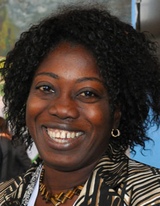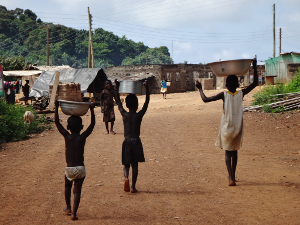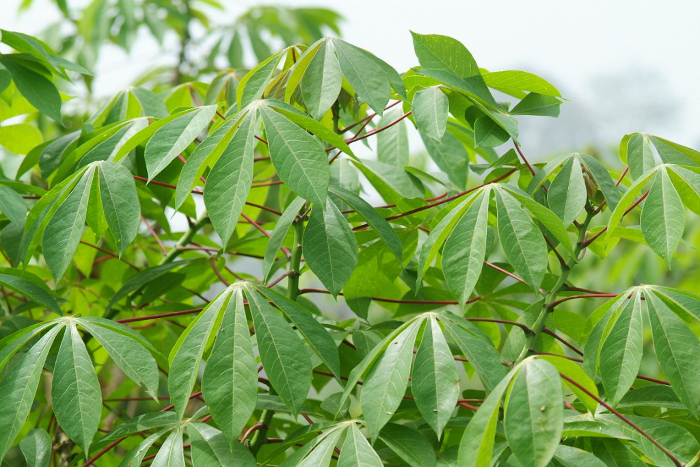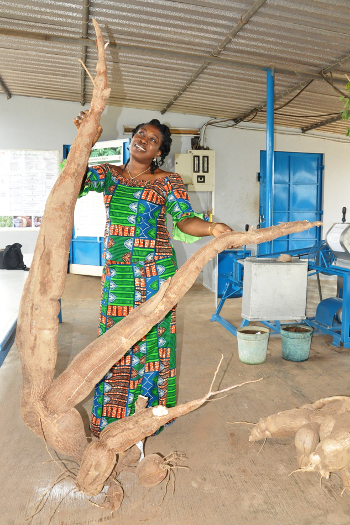Elizabeth Parkes grew up in Ghana as the youngest child and only girl in a middle-class family of nine children. Through visiting poor communities with her family, she began from an early age to build her understanding of the lives of resource-poor families in this part of West Africa and their need for reliable and nutritious food.
She also knows first-hand the important role women play on a farm and in a family. “Rural families are held together by women, so if you are able to change their lot, you can make a real mark,” says Elizabeth.
It was this sense of social conscience that drew her to a career in agricultural research: “My father, a Regional Education Officer, was not very amused; he thought agricultural research was a man’s job!” she recalls.
But Elizabeth was on a mission. “I see African communities where poverty and hunger are seemingly huge problems with no way out,” she says. “If I put in enough effort, I can bring some solutions. My primary target group is the less privileged, and women in particular have been my friends throughout. This sometimes means subtly getting the men to consider some changes in roles.”
This sense of destiny led to Elizabeth gaining a Bachelor’s degree in Agriculture, a Diploma in Education and a Master’s in Crop Science.
Meet Elizabeth in the complete podcast below (or see a playlist on PodOmatic) – and be inspired by her warmth and passion!
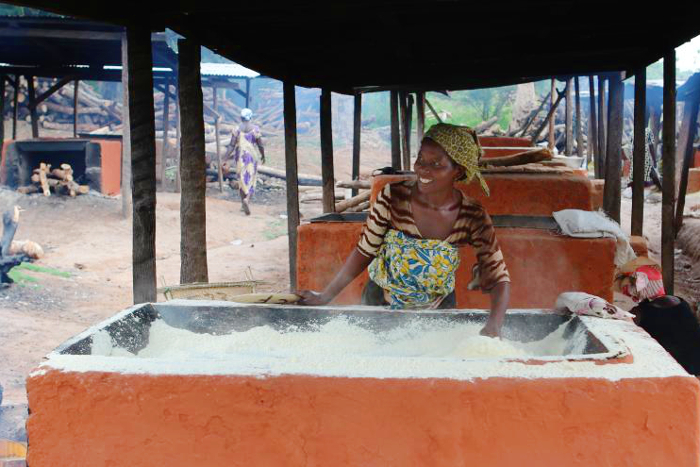
A worker in a Ghanaian cooperative producing garri, or gari, a kind of granular cassava flour used to prepare a range of foods.
Turning point: cassava to help the vulnerable
During a stint of national service between academic degrees, she was based in the tiny poor village of Aworowa in the Brong Ahafo Region. There was no electricity in her room, and the street lights came on once a week.
“We all fetched water from the stream to drink and cook,” Elizabeth recalls. The plight of the villagers inspired Elizabeth to approach a scientist engaged in root and tuber projects at the Crops Research Institute (CRI) of Ghana’s Council for Scientific and Industrial Research (CSIR). She offered to carry out some research on cassava, hoping this might help the local people.
“I saw the struggle for households,” says Elizabeth. “I lived with them for one year, which transformed my interest and focus onto the vulnerable and less privileged.”
As a result, Elizabeth established CRI cassava trials in the region, and these trials continue today with Elizabeth still in touch with the villagers.
When her year of national service finished, Elizabeth was appointed as Assistant Research Officer at CRI – their first woman to be assigned to a research project. Already, she was beginning to fulfil her destiny.
Challenges and opportunities
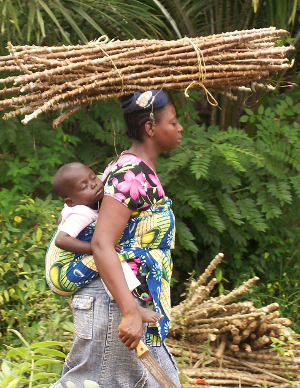
Unlike most crops, cassava is propagated, not by seed, but using cut sections of stem like these – just one of the many challenges this previously neglected crop offers breeders.
But cassava is not the easiest crop for a young researcher to cut their teeth on. It has long been regarded as an ‘orphan’ crop – one that researchers and funders have forgotten in their drive to work with the higher profile crops of wheat, rice and maize.
Cassava is a challenging crop for breeders to work with. “In addition to factors such as pests and disease, cassava is a long-season and very labour-intensive crop. It can take a whole year before you can expect to reap any rewards, and if you don’t have a strong team who can step in at different points throughout the breeding process, you can often find unexpected results at the end of it, and then you have to start all over again,” Elizabeth says.
But while many other young researchers gave up on with cassava, Elizabeth stuck with it, knowing the importance of this crop to farmers, especially women. And this is where Elizabeth’s involvement with the CGIAR Generation Challenge Programme (GCP) really started to make a difference to her future.
During GCP’s first research phase, Elizabeth’s path crossed with GCP scientist Martin Fregene, who encouraged Elizabeth to lead the Ghana partners involved in GCP’s cassava projects. She soon climbed the GCP research ranks, receiving multiple study grants, managing projects, and mixing and mingling with elite scientists. Along the way, Elizabeth also learnt new molecular breeding techniques. More recently, she was appointed Ghana’s lead researcher for GCP’s Phase II Cassava Research Initiative.
A place at the table, and sharing joy
Elizabeth believes the support GCP gave her to develop her skills and capacity is what has made a difference to her own and others’ destinies as research scientists: “GCP has made us visible and attractive to others; we are now setting the pace and doing science in a more refined and effective manner. I see GCP as the pace setters.
“GCP gave you the keys to solving your own problems and put structures in place so that knowledge learnt abroad could be transferred and applied at home.
“When I first joined GCP,” Elizabeth recalls, “I saw myself as somebody from a national research programme being given a place at the table; my inputs were recognised and what I said carried weight in decision-making.”
Elizabeth has attended three GCP Annual (later General) Research Meetings and won awards for her posters. “This greatly boosted my confidence,” she says. She is an active member of the Cassava Community of Practice – founded by GCP and now hosted by the Integrated Breeding Platform (IBP) – which facilitates and supports the integration of marker-assisted selection into cassava breeding. All this has accelerated Elizabeth’s quest to produce and disseminate farmer-preferred cassava varieties that are resistant to pests and diseases.
 “With the Community of Practice you can call on other scientists; you share talk, you share ideas, you share joy. We share everything together,” Elizabeth enthuses. ‘Joy’ is a word that is often on Elizabeth’s lips when she describes the help that GCP has given her and others.
“With the Community of Practice you can call on other scientists; you share talk, you share ideas, you share joy. We share everything together,” Elizabeth enthuses. ‘Joy’ is a word that is often on Elizabeth’s lips when she describes the help that GCP has given her and others.
“We are all forever grateful to GCP and its funders. GCP has had a huge impact on research in Ghana, especially for cassava, rice, maize and yam. All the agricultural research institutes and individual scientists who came into contact with GCP have been fundamentally transformed.”
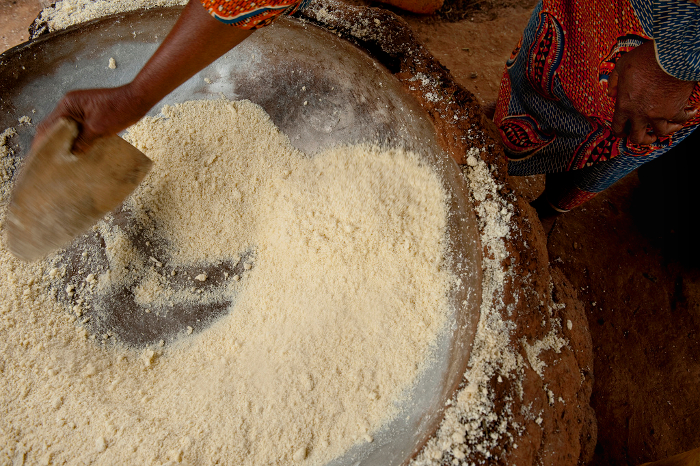
A farmer in Benin transforms cassava into garri, or gari, used as the basis of many different dishes.
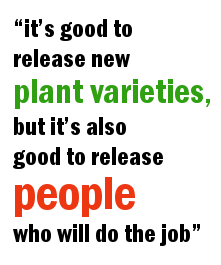 In less than a decade, Elizabeth has become a valued researcher at CRI (currently on secondment at the International Institute of Tropical Agriculture, IITA) as well as Ghana’s leading GCP-supported scientist working on cassava. But in fulfilling her own destiny, she’s also passionate about helping others to achieve their potential.
In less than a decade, Elizabeth has become a valued researcher at CRI (currently on secondment at the International Institute of Tropical Agriculture, IITA) as well as Ghana’s leading GCP-supported scientist working on cassava. But in fulfilling her own destiny, she’s also passionate about helping others to achieve their potential.
“Building human capacity is my greatest joy,” she says. Farmers, breeders and a Ghanaian private-sector company are just a few of the fortunate beneficiaries of her expertise over recent years.
“Wherever I go, whatever opportunity I have, I refer back to GCP and its capacity-building work. You see, it’s good to release new plant varieties, but it’s also good to release people who will do the job.”
Nurturing women
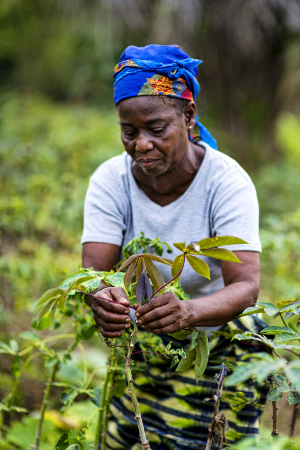
Angelique Ipanga tends her cassava plants in the Democratic Republic of Congo. Cassava is often seen as a “women’s crop,” and the work of cultivating and preparing it falls largely on women’s shoulders.
Elizabeth talks about one of her favourite people, a farmer called Bea: “She’s very serious. She wants to learn more and she keeps expanding her farm.”
Bea hadn’t planted cassava before, so she pestered Elizabeth to find out more about how to do it properly. With Elizabeth’s guidance, Bea’s cassava-growing skills flourished, and she became so successful that she was recognised as the best farmer in her community.
“These are things that make me glad… that at least I have impacted somebody who hadn’t planted cassava before, and it’s amazing,” says Elizabeth. “There are people out there who need us, and when we give them our best, they will give the world their best as well.”
Elizabeth is also passionate about helping other women researchers: “I’ve pushed to make people recognise that women can do advanced agricultural science, and do it well. To see a talented woman researcher firmly established in her career and with her kids around her is thrilling.”
And so Elizabeth is now herself firmly established in world-class agricultural research, and further interesting stories are sure to follow.
“Before GCP we really struggled, but now everybody wants to have training in Ghana. Everybody wants to have something to do with us, and I will always say thank you to GCP for that, for making us attractive as researchers,” Elizabeth says.
“I’ve stuck with cassava because that’s my destiny! I may add other root and tuber crops, but cassava is my pivot.”
More links
- Here on the Sunset Blog: Cassava: ‘there is life’ for African farmers | partnership with CRI
- All the Sunset cassava stories
- Cassava blogposts on the GCP Blog
- Cassava podcasts from Elizabeth (on PodOMatic)
- Cassava Community of Practice (on IBP website)
- Cassava Research Initiative | InfoCentre








